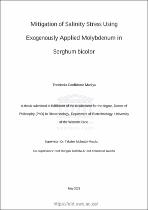| dc.contributor.advisor | Mulaudzi-Masuku, Takalani | |
| dc.contributor.author | Mabiya, Thembeka Confidence | |
| dc.date.accessioned | 2023-05-25T12:33:24Z | |
| dc.date.available | 2023-05-25T12:33:24Z | |
| dc.date.issued | 2022 | |
| dc.identifier.uri | http://hdl.handle.net/11394/10045 | |
| dc.description | Philosophiae Doctor - PhD | en_US |
| dc.description.abstract | The agricultural sector is the main producer of food throughout the world. However, the constant changes in environmental conditions, such as extreme weather, droughts, and salinity have impacted this sector negatively over the years. These stresses cause nutritional imbalance, delayed seed germination and decreased growth resulting in reductions in crop yield and hence affect food prices. The food and agricultural organization (FAO), reported that the average increase rate in crop production is below the amount required to cater for the growing population. Thus, to meet the food demands, discovery of several strategies to improve crop growth and yield under severe environmental conditions are imperative. | en_US |
| dc.language.iso | en | en_US |
| dc.publisher | University of the Western Cape | en_US |
| dc.subject | Biotechnology | en_US |
| dc.subject | Sorghum bicolor | en_US |
| dc.subject | Molybdenum | en_US |
| dc.subject | Agriculture | en_US |
| dc.subject | Climate change | en_US |
| dc.title | Mitigation of salinity stress using exogenously applied molybdenum in sorghum bicolor | en_US |
| dc.rights.holder | University of the Western Cape | en_US |

